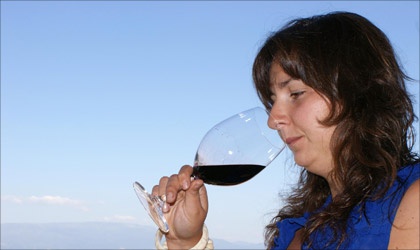
Joana Cunha is an oenologist in the Dão region. Currently, “a region which is out of favour. Many mistakes have been done in the past which are reflecting on today. The Dão region is currently unpopular”. But according to Joana, which during the grape-picking season also worked in the Douro, the Dão has many advantages. “The wines are elegant, fresh, balsamic, mineral, and with a fantastic acidity which allows them to age for 20 or more years”.

Since 2005, she has been the oenologist at Quinta da Nespereira in Gouveia, where she is responsible for the Sarmenu and Vineaticu wines. In the Quinta do Mondego, her family’s farm, she is responsible for the viticulture and oenology of the Quinta do Mondego and the Munda wines, a project sponsored by Francisco Olazabal from the Quinta Vale Meão. Although her work is mainly in the Dão region, Joana recollects last year’s experience. She spent the grape-picking season in Australia where she grew both personally and professionally, leading to her new aspiration of spending more grape-picking seasons abroad.
A confessed fan of the wines produced at the Centro Estudos Vitivinícolas do Dão, she loves producing red wines, yet the wine that she most enjoyed producing was her first white wine. “Not because it was my best, but because it was my first! And not to mention the fact that I love the Encruzado caste: it’s mineral, fresh, embodied, and with strong and balanced acidity which makes its wines very crispy with a great ageing potential. I think that in a certain way, I was inspired by the Centro de Estudos Vitivinícolas do Dão’s old Encruzado wines.
“With bad grapes you can’t make a good wine!”, she states. The greatest concern is the berry and picking the grapes at their ideal point of maturity. “The Dão is a region where the phytosanitary treatments must be carried out in a timely fashion so as to avoid any Downy Mildew, Powdery Mildew and mould problems. If this is not achieved, there will be a decrease, not only in terms of quantity, but of the quality of the grapes”. Her objective is to create wines of “excellent quality, without any substantial additions or technologies”.

- 1

-
 Joana Roque do ValeThe Roquevale family has a great tradition in winemaking. At first in the Estremadura regi…Read article ›
Joana Roque do ValeThe Roquevale family has a great tradition in winemaking. At first in the Estremadura regi…Read article › -
 Martta SimõesMartta Simões cherishes the memory of when she first felt, during a grape-picking s…Read article ›
Martta SimõesMartta Simões cherishes the memory of when she first felt, during a grape-picking s…Read article › -
 Filipa Tomaz da CostaFilipa Tomaz da Costa would like to make the best white wine in the world. And apart from …Read article ›
Filipa Tomaz da CostaFilipa Tomaz da Costa would like to make the best white wine in the world. And apart from …Read article › -
 Rita MarquesWith just over twenty years of age, Rita Marques is a producer and oenologist in the Douro…Read article ›
Rita MarquesWith just over twenty years of age, Rita Marques is a producer and oenologist in the Douro…Read article › -
 Susana EstebanSusana Esteban, as the name gives away, is not Portuguese, she is a Galician from Tui. How…Read article ›
Susana EstebanSusana Esteban, as the name gives away, is not Portuguese, she is a Galician from Tui. How…Read article › -
 Filipa Pato“It would not have crossed my mind to make wine, if I hadn’t lived in a vineya…Read article ›
Filipa Pato“It would not have crossed my mind to make wine, if I hadn’t lived in a vineya…Read article › -
 Joana CastroJoana Castro is responsible for the oenology and management at Quinta de Lourosa, a farm i…Read article ›
Joana CastroJoana Castro is responsible for the oenology and management at Quinta de Lourosa, a farm i…Read article › -
 Sandra Tavares SilvaSandra Tavares da Silva considers herself to be an “adopted daughter” of the D…Read article ›
Sandra Tavares SilvaSandra Tavares da Silva considers herself to be an “adopted daughter” of the D…Read article ›







